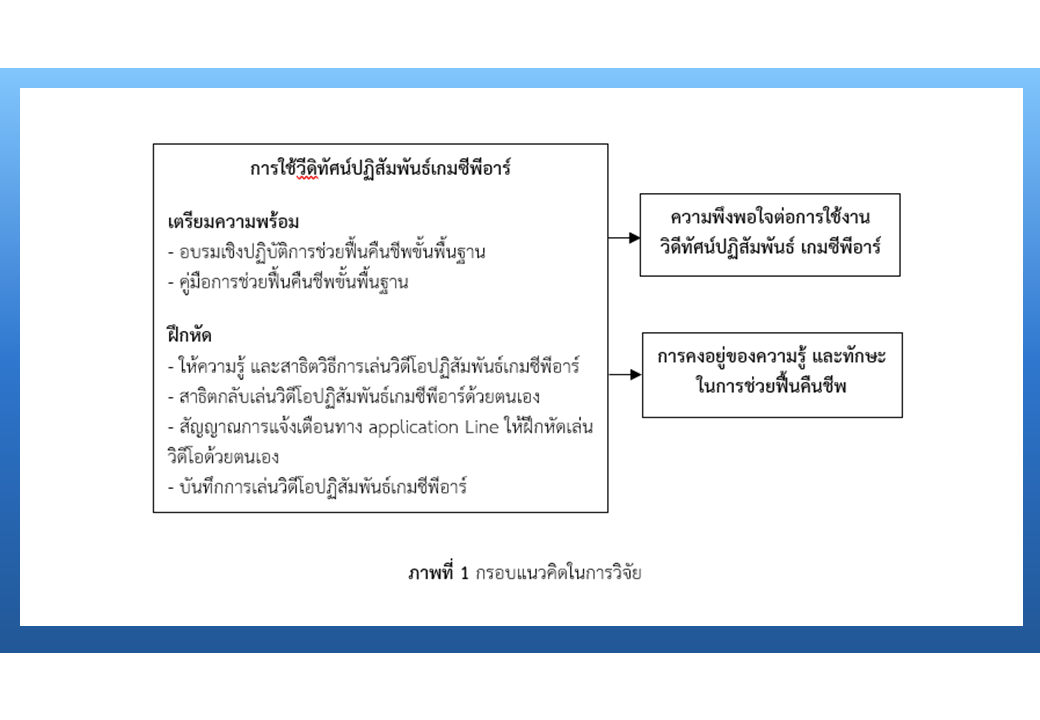ผลของการใช้วีดิทัศน์เกมปฏิสัมพันธ์ซีพีอาร์ต่อการคงความรู้ และทักษะในการช่วยฟื้นคืนชีพของอาสาสมัครสาธารณสุข
คำสำคัญ:
เกมซีพีอาร์, การช่วยฟื้นคืนชีพ, การคงความรู้และทักษะ, อาสาสมัครสาธารณสุขประจำหมู่บ้านบทคัดย่อ
วัตถุประสงค์ของการวิจัยนี้ เพื่อศึกษาผลของการใช้วีดิทัศน์ปฏิสัมพันธ์เกมซีพีอาร์ต่อการคงอยู่ของความรู้ และทักษะในการช่วยฟื้นคืนชีพของอาสาสมัครสาธารณสุขประจำหมู่บ้าน (อสม.) และทดสอบประสิทธิภาพของวีดิทัศน์ปฏิสัมพันธ์เกมซีพีอาร์ กลุ่มตัวอย่างเป็น อสม. จำนวน 50 คน แบ่งเป็นกลุ่มทดลองและกลุ่มควบคุม กลุ่มละ 25 คน กลุ่มทดลองได้รับการอบรมการฟื้นคืนชีพ คู่มือ และวีดิทัศน์ปฏิสัมพันธ์เกมซีพีอาร์ กลุ่มควบคุมได้รับการอบรมการฟื้นคืนชีพ และคำแนะนำแหล่งข้อมูลเพิ่มเติมเพื่อศึกษาด้วยตนเอง เครื่องมือวิจัย 1) วีดิทัศน์ปฏิสัมพันธ์เกมซีพีอาร์ 2) คู่มือ 3) แบบประเมินความรู้ และทักษะการช่วยฟื้นคืนชีพขั้นพื้นฐาน และ 4) ประเมินความพึงพอใจการใช้งานวีดิทัศน์ วีดิทัศน์มีค่าดัชนีความตรงของเนื้อหา เท่ากับ .88 ประสิทธิภาพวีดีทัศน์จากผู้เชี่ยวชาญ เท่ากับ 3.36 และประสิทธิภาพอยู่ในเกณฑ์ 80/80 วิเคราะห์ข้อมูลด้วยสถิติเชิงพรรณนา Mann - Whitney U test และสถิติ Wilcoxon signed ranks test
ผลการวิจัย พบว่า วีดิทัศน์ปฏิสัมพันธ์เกมซีพีอาร์มีประสิทธิภาพสูง ร้อยละ 60.00 ของ อสม. ที่ใช้วีดิทัศน์มีความพึงพอใจระดับมากที่สุด หลังอบรม 1 เดือน ค่าเฉลี่ยความรู้และทักษะการช่วยฟื้นคืนชีพของ อสม. ที่ใช้วีดิทัศน์สูงกว่า อสม. ที่ไม่ใช้อย่างมีนัยสำคัญทางสถิติ (p-value < .05) แสดงให้เห็นว่าวีดิทัศน์ปฏิสัมพันธ์เกมซีพีอาร์นี้มีประสิทธิภาพ อสม. มีความพึงพอใจในการใช้ และส่งผลต่อการคงอยู่ของความรู้ และทักษะการช่วยฟื้นคืนชีพของ อสม.
เอกสารอ้างอิง
Panchal AR, Bartos JA, Cabañas JG, Donnino MW, Drennan LR, Hirsch KG, et al. Part 3: adult basic and advanced life support: 2020 American heart association guidelines for cardiopulmonary resuscitation and emergency cardiovascular care. Circulation 2020;142(16):366-468. doi: 10.1161/CIR.0000000000000916.
Thai Resuscitation Council. Manual for basic life support and automated external defibrillators (AED) for the people 2020. Bangkok: Panyamit Printing; 2020. (in Thai)
Limsurikan W. Factors associated with the outcome of out-of-hospital cardiac arrest at emergency department Phra Nakhon Si Ayutthaya hospital. Journal of Preventive Medicine Association of Thailand 2018;8(1):15-23. (in Thai)
Buranasakda M, Wangsri K, Ienghong K, Kotruchin P, Rattanaseeha W. Survival outcome of out-of-hospital cardiac arrest in emergency medical service with and without physician staffed. Srinagarind Medical Journal 2017;32(2):105-10. (in Thai)
Ministry of Public Health. Royal Gazette, Regulations of the Ministry of Public Health on Village Public Health Volunteers 2011 [Internet]. 2023 [cited 2023 Aug 12]. Available from: https://www.obtnongpan.go.th/index/load_data/?doc=9957 (in Thai)
Primary Health Care Division. Report on the number of volunteers by sub-district [Internet]. 2020 [cited 2020 Oct 30]. Available from: http://www.thaiphc.net/phc/phcadmin/administrator/Report/OSMRP000S8.php (in Thai)
Primary Health Care Division. Report on the results of volunteer development (VHV 4.0) for fiscal year 2020 [Internet]. 2021 [cited 2021 Oct 30]. Available from: https://www.thaiphc.net/new2020/content/4 (in Thai)
Yeung J, Djarv T, Hsieh J, Sawyer T, Lockey A, Finn J, et al. Spaced learning versus massed learning in resuscitation - a systematic review. Resuscitation 2020;156:61-71. doi: 10.1016/j.resuscitation.2020.08.132.
Riggs M, Franklin R, Saylany L. Associations between cardiopulmonary resuscitation (CPR) knowledge, self-efficacy, training history and willingness to perform CPR and CPR psychomotor skills: a systematic review. Resuscitation 2019;138:259-72. doi: 10.1016/j.resuscitation.2019.03.019.
Pitaksongkram P, Jamjan L. Game-based education for a transformation of nursing students’ learning experiences: the STEM education project. Nursing Journal of the Ministry of Public Health 2021;31(1):1-13. (in Thai)
Thongpradab J, Lohacheewa S, Preeyanon L. Effects of game-based learning on nursing students’ knowledge of english psychiatry terminology. Journal of Thailand Nursing and Midwifery Council 2022;37(4):111-24. (in Thai)
Chartnuch W. A study on the development of primary education level 5 student aural skills thought the use of the activity package based on Throndike’s theory of learning. [Dissertation]. Bangkok: Dhurakij Pundit University; 2017.
Department of Health Service Support, Ministry of Public Health. The number of health volunteer [Internet]. 2023 [cited 2023 Aug 30]. Available from: https://www.thaiphc.net/new2020/cremation/district?year=2562&province=56 (in Thai)
Kim HJ, Suh EE. The effect of patient-centered CPR education for family caregivers of patients with cardiovascular diseases. Journal of Korean Academy of Nursing 2016;46(3):463-74. doi: 10.4040/jkan.2016.46.3.463.
Chyung SY, Roberts K, Swanson I, Hankinson A. Evidence-based survey design: the use of a midpoint on the Likert scale. Performance Improvement 2017;56(10):15-23. doi: 10.1002/pfi.21727.
Wanichbancha K. Research statistics. Bangkok: Faculty of Commerce and Accountancy, Chulalongkorn University; 2012. (in Thai)
Papadimitriou L, Xanthos T, Bassiakou E, Stroumpoulis K, Barouxis D, Iacovidou N. Distribution of pre-course BLS/AED manuals does not influence skill acquisition and retention in lay rescuers: a randomised study. Resuscitation 2010;81(3):348-52. doi: 10.1016/j.resuscitation.2009.11.020.
Charlier N. Game-based assessment of first aid and resuscitation skills. Resuscitation2011;82(4):442-6. doi: 10.1016/j.resuscitation.2010.12.003. (in Thai)
Mpotos N, Yde L, Calle P, Deschepper E, Valcke M, Peersman W, et al. Retraining basic life support skills using video, voice feedback or both: a randomised controlled trial Resuscitation 2013;84(1):72-77 doi: 10.1016/j.resuscitation.2012.08.320.
Ahmed S, Ismail I, Lee K, Lim PK. Systematic review on knowledge and skills level among nurses following cardiopulmonary resuscitation training [Internet]. 2021 [cited 2023 Aug 23]. Avaliable from: https://doi.org/10.21203/rs.3.rs-951043/v1
Aiemyeesoon P. Psychomotor domain assessment. Wipitpatanasilpa Journal of Arts,Graduate School 2021;1(2):18-32. (in Thai)
Oermann H, Suzan E, Kardong E, Maryon TO. Effects of monthly practice on nursing students’ CPR psychomotor skill performance. Resuscitation 2011;82(4):447-53. doi: 10.1016/j.resuscitation.2010.11.022.
Boet S, Bould MD, Pigford AA, Rössler B, Nambyiah P, Li Q, et al. Retention of basic life support in laypeople: mastery learning vs. time-based education. Prehospital Emergency Care 2017;21(3):362-77. doi: 10.1080/10903127.2016.1258096.

ดาวน์โหลด
เผยแพร่แล้ว
รูปแบบการอ้างอิง
ฉบับ
ประเภทบทความ
สัญญาอนุญาต
ลิขสิทธิ์ (c) 2023 วารสารเกื้อการุณย์

อนุญาตภายใต้เงื่อนไข Creative Commons Attribution-NonCommercial-NoDerivatives 4.0 International License.
















